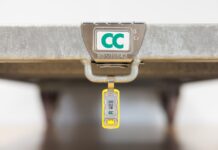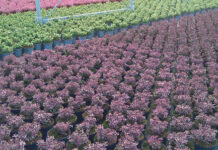Please carefully note the following information when importing or otherwise risk delays or entry refusal at the Irish border:
- All importers of regulated plants and plant products must notify the Department a minimum of 24 hours in advance of shipping by completing and submitting the UK Plant Import application form.
- Regulated plants and plant products coming from the UK must be accompanied by a valid phytosanitary certificate.
- All wood packaging material and dunnage must be stamped with the ISPM 15 mark. Please refer to the Wood Packaging Material section on the page for detailed information.
Imports Arriving at Dublin Port & Rosslare Port
These import procedures cover procedures for Dublin Port, Rosslare Port for all consignments of plants and plant products coming from the UK. Only registered traders approved to import may apply to import regulated plants and plant products from the UK.
Importers are required to follow the steps and advice below:
1. Complete the UK Plant Import Application form (form to follow)
2. E-mail the fully completed form 24 hours in advance of shipping with the following attachments to: UKplantandhortimports@agriculture.gov.ie:
- Copy of the Original Phytosanitary Certificate (Colour scanned copy)
- Copy of the Invoice
- Copy of the Bill of Lading*/Airwaybill
*excludes ro/ro traffic
3. You will then receive an automatic confirmation email that DAFM have received your application. This email will contain a Case Reference Number. This is an automated reply and only refers to receipt of the email and is not an approval for entry.
4. If your application form is incomplete or missing documents you will be notified of this via email. The email will outline what information or documents are still required. In this case, you must resubmit the application using the UK Plant Import Application form (above) again quoting the unique Case Reference number. This form together with the outstanding information must be emailed to UKplantinfo@agriculture.gov.ie
Please note due to the high volumes of applications we will be dealing with and incomplete application forms will cause delays in processing your application form.
5. The consignment may be inspected by an officer from the Plant Protection Service of the Department of Agriculture, Food and the Marine at the point of entry before release from Customs.
6. The Department of Agriculture, Food and the Marine may have the consignment inspected at any time; carry out tests on the consignment and take samples if necessary; have the consignment destroyed or treated as may be considered necessary.
7. If any part of the consignment is thought to present a plant health risk to the Community, it may be necessary to have the whole consignment destroyed.
8. On arrival, the consignment will be subjected to a Documentary Check, an Identity Check and may be subjected to a Physical Examination by an official of the Horticulture and Plant Health Division.
9. On successful completion of DAFM’s checks, the consignment will be issued with a Clearance Certificate via email to the person responsible for the load DAFM will also notify Customs of its decision.
A Clearance Certificate as it relates to plant health requirements will allow the importer/customs agent/person responsible for the load have the consignment released by Customs.
Note: It is the responsibility of the importer to ensure that any additional documentary processes necessary to clear Customs Control have been completed.
10. If a consignment is rejected at any stage of the checking process, the person responsible for the load will be notified via email outlining the reasons for rejection.
Imports Arriving at Dublin Airport
These import procedures cover procedures for Dublin Airport only for all consignments of plants and plant products coming from the UK. Only registered traders approved to import may apply to import regulated plants and plant products from the UK.
Applicants are required to follow the steps and advice below:
1. Complete the Plant Import Request (PIR) Form (doc 139Kb)
2. E-mail the fully completed PIR form 24 hours in advance of shipping to:
plantimports@agriculture.gov.ie
Failure to complete and return this form to the above address may result in a delay in the granting of an Importation Licence.
3. On arrival of the consignment at Dublin Airport, the importer must submit the following completed documentation via email to: phbipairport@agriculture.gov.ie
Completed Confirmation of Arrival of Consignment (CAC) Form
- Completed Confirmation of Arrival of Consignment (CAC) Form
- Phytosanitary Certificate (colour scan)
- Commercial invoice
- Airway Bill
4. The consignment may be inspected by an officer from the Plant Protection Service of the Department of Agriculture, Food and the Marine at the point of entry before release from Customs.
5. The Department of Agriculture, Food and the Marine may have the consignment inspected at any time; carry out tests on the consignment and take samples if necessary; have the consignment destroyed or treated as may be considered necessary.
6. If any part of the consignment is thought to present a plant health risk to the Community, it may be necessary to have the whole consignment destroyed.
7. On arrival, the consignment will be subjected to a Documentary Check, an Identity Check and may be subjected to a Physical Examination by an official of the Horticulture and Plant Health Division.
8. On successful completion of DAFM’s checks, the consignment will be issued with a Clearance Certificate via email to the person responsible for the load DAFM will also notify Customs of its decision.
A Clearance Certificate as it relates to plant health requirements will allow the importer/customs agent/person responsible for the load have the consignment released by Customs.
Note: It is the responsibility of the importer to ensure that any additional documentary processes necessary to clear Customs Control have been completed.
If a consignment is rejected at any stage of the checking process, the person responsible for the load will be notified via email outlining the reasons for rejection.








